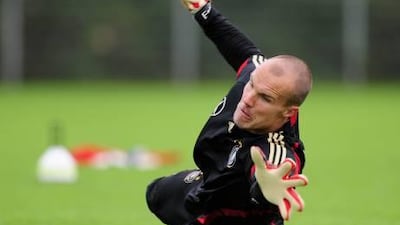"A wonderful fact to reflect upon, that every human creature is constituted to be that profound secret and mystery to every other." – Charles Dickens
It also can be, of course, a horrible fact to reflect upon, as for football people trying to come to terms with Gary Speed's apparent suicide, as with Shay Given sobbing in goal on Sunday, an image already en route to indelible.
Every so often, we do get a reminder that we wander through life without knowing much of anything. Adrift among mysteries, we can hope that maybe one or two, now and then, might ease into something approaching logic.
Maybe that starts happening right about now, as maybe we can start jettisoning the idea of the professional athlete as sturdier and happier and more enviable than other people.
This thought does not come just from Speed. It comes from what comes after learning of Speed and doing a little reading.
In North America alone, the suicides have dropped in one by one across weeks and months, such that you might compartmentalise each without digesting the whole.
The professional golfer Erica Blasberg died at 25 in May 2010, and the NFL receiver Kenny McKinley at 23 in October 2010, then in 2011 the former National Hockey League player Tom Cavanagh at 28, the Olympic skier Jeret Peterson at 29, the former National Football League all-star Dave Duerson at 50, the former baseball pitcher Hideki Irabu at 42, the former NHL player Rick Rypien at 27, the former baseball pitcher Mike Flanagan at 59, the former NHL player Wade Belak at 35. Of recent years note in Europe was the German goalkeeper Robert Enke, who stepped in front of a train at 32.
Such a thick paragraph should not brand the world's sampling of athletes as any more vulnerable than the general population, but it does shout out a humanity not often ascribed to the heroes.
And the various stories do suggest they cope with a singular set of pressures.
In a much-noted case, Duerson shot himself through the chest with the presumed intent of preserving his brain, leaving a note instructing that the brain go to researchers, according to numerous media outlets.
In May, Boston University researchers announced their findings, with Dr Ann McKee saying: "Dave Duerson had classic pathology of CTE (Chronic Traumatic Encephalopathy) and no evidence of any other disease, and he has severe involvement of all the [brain]structures like judgement, inhibition, impulse control, mood and memory."
The cases of the young NHL tough guys, in particular, have disfigured the idea of athletic roughhousing as some entertaining joyride. They have reshaped the hardy as vulnerable.
Other cases have turned up spectres such as debt and mental illness, so while they all can occupy the same paragraph, they cannot occupy the same category.
Somehow, though, all just might fit under one expansive umbrella: that of how we all perceive athletes, plus how athletes internalise the perception.
"Football is a tough sport and there really is no support network for those who are troubled and in need of help," the former Liverpool player Alan Hansen wrote in the Daily Telegraph after learning of Speed's death, soon adding: "Players know that any admission of a problem or a call for help would see them annihilated by their teammates once they started to feel good again, so as a result there would be a real air of silence when it came to telling people that you need help.
"We don't know the circumstances of Gary's death, but as a former player, he will have been brought up in that same dressing room environment."
It is a dishonest culture of a deathless pretence, but beyond that, further details fed the shock over Speed. He left behind a wife and two adolescent sons.
He had appeared on the BBC on Saturday brimming with anticipation of the World Cup qualifying campaign through which he would manage Wales.
As James Lawton wrote in the Independent: "Even after allowing that some famous, hugely rewarded footballers might lead lives of desperation in varying degrees of quiet, it would still have been a huge reach to imagine Gary Speed could have been one of them."
Lawton described Speed as "a man who never seemed to lose his balance".
The bewilderment in there is ironclad rational. Nobody should quibble with it. Maybe across time, though, as we comprehend a bit more, and hold unwarranted ideas of athletes a bit less, and maybe even jettison the envy many feel, we might find the mystery ebb, and that might end up helping some people.
Follow
The National Sport
on
& Chuck Culpeper on

